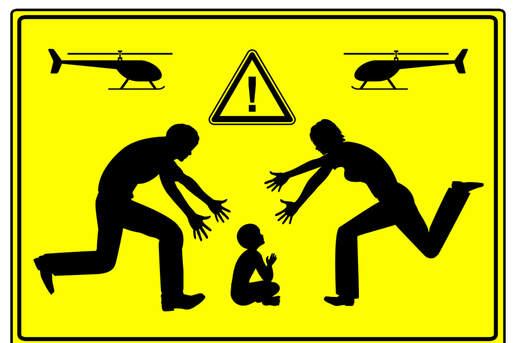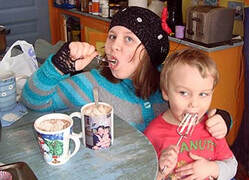|
A while ago, I wrote a blog piece about the importance of paying attention to your child. The inspiration for that post came from an article about distracted parenting and the rise of childhood accidents due to cell phone use. It’s still a very important thing for all of us to think about. Children crave our attention and notice when we’re not paying attention to them. We don’t want them to be glued to their devices, so we should not be modeling that. However, there is another side to the issue of attention. Some of us pay too much attention to our children, not allowing them to have lives of their own to develop their own sense of safety and their own likes and dislikes. This has been referred to as “helicopter parenting.” I only heard this term recently, but it resonated with me fully. My own mother was a helicopter parent. She hovered over me, choosing my clothes, my hobbies and even my friends. The only time I could get away from her was when I played outside or when I went to school. Even when I played outside, she would sometimes come out and direct the games with the neighborhood kids, which for me was humiliating. I didn’t mind having involved parents and felt lucky in some ways, but she went overboard. I wasn’t made to do chores because I didn’t do them exactly the right way. Homework was always supervised, so I stopped bringing it home. As I grew older, I resented her constant intervention and rebelled whenever and wherever I could. My mom and I fought constantly. I’ve always felt sorry that we couldn’t figure out how to find a common ground or make some kind of compromise. The harm that was done to me as a result was huge. I moved out on my own not knowing how to take care of myself or even how to do simple tasks such as doing my laundry, keeping my house tidy and clean or shopping for my own food. I floundered with fashion, wearing outrageous outfits that I should have experimented with as a child. I bought too much of one kind of food and not enough of another. I didn’t know how to budget money because I never had any of my own and was not allowed to work, even as a teenager, except for a rare babysitting job. I found myself in dangerous compromising situations because I’d never honed my own sense of danger. My mother was the child of an alcoholic, and I now realize that her control issues were a symptom of feeling out-of-control as a child. It is a common occurrence in adult children of alcoholics. Although I finally understood my mom’s motivations, that understanding didn’t help me to be able to function any easier. As a result, I determined to teach my own children self-reliance. There were times when I probably went a little overboard, like when I insisted that my 3-year old daughter go up to the fast food counter to ask for her own ketchup. But I meant well. And, I’m sure, so did my mother. One of the things I think I did right was in not assisting my children to climb something they couldn’t reach on their own. If they had to get themselves into a tree or climbing structure by themselves, I felt that they would have a better sense of their safety, and I saw that work time after time. If they could get up, they were always able to get down and didn’t freeze out of fear. I would watch other children be boosted into something they wanted to climb, and either be afraid because they went too high and had to be helped back down, would start crying for help almost immediately because they were unsure of themselves, or they would slip and fall because they had a false sense of security. I also made sure that my kids always had their own money to do with what they wanted. Their money was not tied to chores. They got an allowance because they were a part of the family. Their allowance was half their age. They sometimes asked for advice on what to do with it, but I never volunteered that information on my own. All three of them handle money differently as adults. My youngest is much better than anyone else in the family about money, and I take no credit for that. The credit goes to him and what he figured out for himself. However, unlike him, my two older children grew up during a time when their dad and I were below the poverty level, so they sometimes felt deprived which I know affected the way they dealt with finances. When my children were babies, I was overwhelmed with making money and keeping up a household. I didn’t spend every minute observing them. I kept my eye on them, but they had time on their own, too. If I needed to take a shower, I would put them in their crib to play. If I was doing dishes or laundry, I would put up a baby gate so that they could hear and see me but not be underfoot or getting into trouble. They learned to occupy themselves. This is an important skill for all of us to develop. In this age of televisions in every house, cell phones and other electronic devices, children are needing to be entertained every minute, or they are bored to tears. Most of us have known “only” children who are demanding and selfish. They’re not born that way. It’s learned behavior for them because their parents cater to their every whim. I’m sure I did that with my first child for a while. How could we not? They are everything to us, and of course we want them to be happy. However, once a sibling comes along, there’s another child that gets tossed into the mix, and everything changes. We are forced to alter our parenting to accommodate two. Suddenly, the first child might have to wait to have that book read. They might not get to go for a walk when they want because their younger sibling is napping. Or, maybe they can’t be as loud for fear that they’ll wake the baby. Parents often feel guilty, but we have to realize that it’s the natural course of things. Our children need to feel disappointment. They need to learn to wait and accept the fact that they may not get everything they want when they want it because the rest of the world will probably not be as accommodating as their parents, and shouldn’t they learn that while they’re young? This doesn’t mean that we don’t still try to make our children happy. Of course, we should play with them, read to them, sing with them, take them on outings and cuddle them. It just means that we need to temper that with our own needs. Our children learn about life from us. We are teaching them about love and relationships, including self-love. I’ve had musician friends who have given up their instruments because their children didn’t like it when they played. What is that teaching them? I’ve had other musician friends who ignored their children when playing their instruments, and what is that teaching them? The biggest lesson here is one of balance. When I’m playing a song or talking to someone and my child or grandchild wants my attention, I ask them to wait a minute. When the song is over, or the conversation is paused, I respond to what they want. If it’s something that’s really important, I stop what I’m doing and attend to it. If they’re asking because they’re bored or jealous of me not giving them my undivided attention, I remind them that I’m doing what I love and invite them to join in or wait until I’m finished. I never make them wait too long because I want them to learn that I will be there for them but also get to enjoy what I love. In doing that, I’m teaching them that we are all equally important. Automatic self-sacrifice in every situation is not necessarily a lesson I want them to learn. My own parents were very affectionate with each other. They danced together, hugged and cuddled. I grew up seeing that as natural. After all, I was a product of that love. Did I feel jealous when I saw my mom sitting on my dad’s lap? Sure, I did. Did she hop off because of that? Certainly not. They explained that they loved each other just as they loved me, and I would get my turn. That’s what it all boils down to … taking turns and sharing. And, it’s not just about sharing toys but sharing time and affection, too. Ultimately, parents know best how to raise their own children, but sometimes it's helpful to have a different perspective. I know it was always helpful to me. No one can tell us if we are doing right or wrong. We all have to judge for ourselves. We each know our own children and situations, and this topic is a tricky one. Once again, it's all about balance.
0 Comments
 As I was adjusting my rear view mirror in my car the other day, I started thinking about parenting hacks. I realized that my mirror is adjusted backwards to how most people have theirs. Mine points down when I switch it, instead of up. The reason for this is that I have had children riding in the back seat of my car for so long. When my mirror is adjusted that way, it only takes one little click to be able to see what's happening in the back. There's no need to turn around while I'm trying to keep my eyes on the road. I could just glance in the mirror. It also helps keep the chaos down to a minimum because they know I can see them whenever I want. Another hack I used was to wear overalls with a hammer loop on the side. When my daughter was 3 and my son was a newborn, I had no car and walked everywhere. Although the baby was in a pack, I still often needed both hands free for carrying things, so my daughter learned to hold on to the hammer loop instead of holding my hand. I also had safety pins on my belt loops, just in case, and always had some kind of toys and snacks in my backpack to ward off tantrums. We often went out as a family to after-dark parties or other events such as music festivals. I fell in love with glow sticks and light-up sneakers. They were lifesavers. In their light-up shoes, I could always see where my children were. I would have them draped in glowsticks as well, but they also lined our blanket so the kids could wander a bit and still find us in the dark, and we practiced going back to our spot until they were confident. I even floated glowsticks in a bath one especially rough and whiney night and turned out all of the lights, creating a magical glowing bath and saving the day. When my oldest son was just starting to walk, he loved to wander off. That boy was an escape artist, climbing under and over everything in his way. It was becoming increasingly difficult to contain him, and I was too busy to hover over him constantly. I also believed in letting my children have a little autonomy as a learning tool. I believe that if we are constantly there, protecting them and paving their way, they won't be self-sufficient. They need to have scrapes and bruises occasionally to learn. I didn't neglect them, but they had times when I wasn't watching. The house was childproofed to afford them that luxury. But my boy was a wild child. I attached bells to his shoes and his clothes so that I could hear wherever he went. Occasionally, when the sound of the bells stopped, I knew he had removed his clothes and was probably getting into some terrible mischief. That was a very useful hack. I was able to be in the kitchen or bathroom without having to cart him around with me. I'm sure there are more that I've forgotten over the years. I was always trying to think of new ways to make my parenting life easier. I'd love to know what your parenting hacks are. Please share them for all of us to see. Remember, we're all in this together with no manual to refer to when we're struggling. I was chatting with a couple of moms after music class this week, and the topic came up of how to deal with well-meaning grandparents who spoil your child. The simple straight-forward answer is, “Just talk to them about it, setting your limits clearly.” However, that’s not always as easy as it may sound. We adults often dance around what we want to say without being clear out of fear of offending the other person. Or sometimes, it’s the receiver who takes what’s said as an attack rather than a request for support. We could learn a lot from our children who often blurt out whatever is on their minds without much thought to how the other person will react.
Grandparents don’t have to be with your child every day, setting and enforcing limits. They already did that with their own children and want to enjoy being the “good guy” for a change. They want to be able to play without the restrictions of rulemaking. That’s understandable, but they also need to learn how to do that without undermining the parents. As a grandparent, I am much more flexible, patient and playful than I was with my children. I don't have the constraints of day-to-day parenting and the stresses that go along with that. but it’s a delicate balance. If grandparents live a far distance away, I think it’s healthy for them to go overboard during the time they are visiting. However, if they are close by and see your children often, they need to learn to play within the parameters of your household rules. It’s very similar to co-parenting with exes in a divorce. In your own household, you have your own rules. This goes for the grandparents’ houses, too. For example, if they want to let your kids jump on their couch, and it’s not necessarily dangerous, let them. Just make sure your children understand that the rule is different for your couch. The reverse can be true, too. When I had children in my home, I always allowed them to eat in the car. It made my life much easier. Now, I don't allow it anymore. I'm tired of having crumbs and trash in my car. Not that my car is spotless, far from it, but it's no longer filled with old food wrappers, crumbs and bottles. Our priorities change as we age. Then there's the subject of in-laws. This is always such a delicate balance. Most of the time, we don’t want to offend them and certainly want them to like us, and they feel the same way. However, that’s not always the case. Sometimes there are tensions because of jealousy or judgements. These are not easy to navigate but try to keep in mind that your in-laws are your spouse’s family. They raised him or her, and they must have done a good job, or you wouldn’t be with them. Your in-laws may be feeling a great loss or have some other feelings that they don’t feel comfortable sharing with you. The best thing that we can do in those situations is to try to be as accepting as possible and hope they will come around. Sometimes, talking about the issue is the best way to clear the air. At least you know where you stand instead of guessing. Communication is always the best way to go when there are issues around our children, whether it’s with our spouses, parents or in-laws. We will never move forward without talking things through. Resentments will build, often until they feel insurmountable. I have had wonderful conversations with my parents, in-laws and spouse and may have had an equal number of falling outs with them as well. Regardless of the circumstances, in one way or another, the outcome was always beneficial to the children involved. I’ve had to learn to speak out and also to listen openly without letting my feelings get in the way. As an older person, it’s sometimes difficult for me to sit back and listen. I’ve waited a long time to be an elder. I am now in the time of life for sharing my wisdom, and I sometimes resent younger folks trying to "teach" me or share their wisdom. I can't count the number of times i have felt like saying (or have said), "Wait your turn. You're young. Your time will come." But I’ve learned a lot from listening to my children and respecting their experience as parents. I've learned a lot from my students and from people of all ages. We’re never too old to learn. I think most of the difficulty comes in the presentation, not the substance. |
Archives
April 2019
Categories |



 RSS Feed
RSS Feed